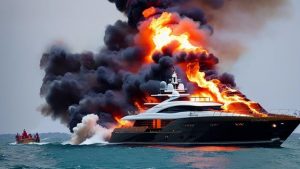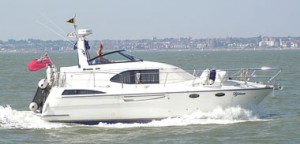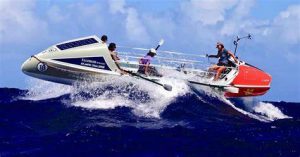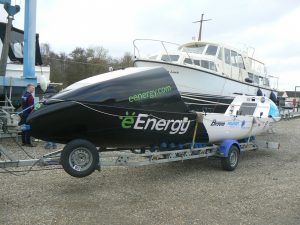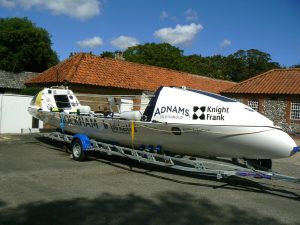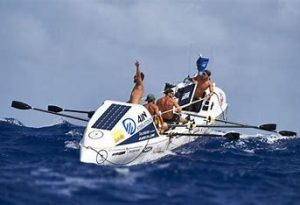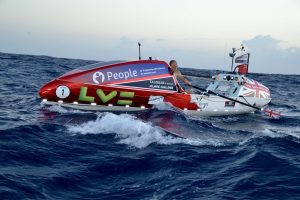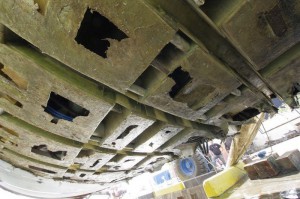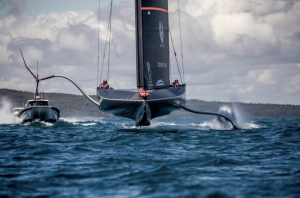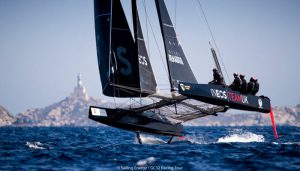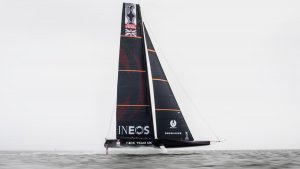Fairline Yachts seeks buyer as administrators secure fundingFebruary 11, 2025
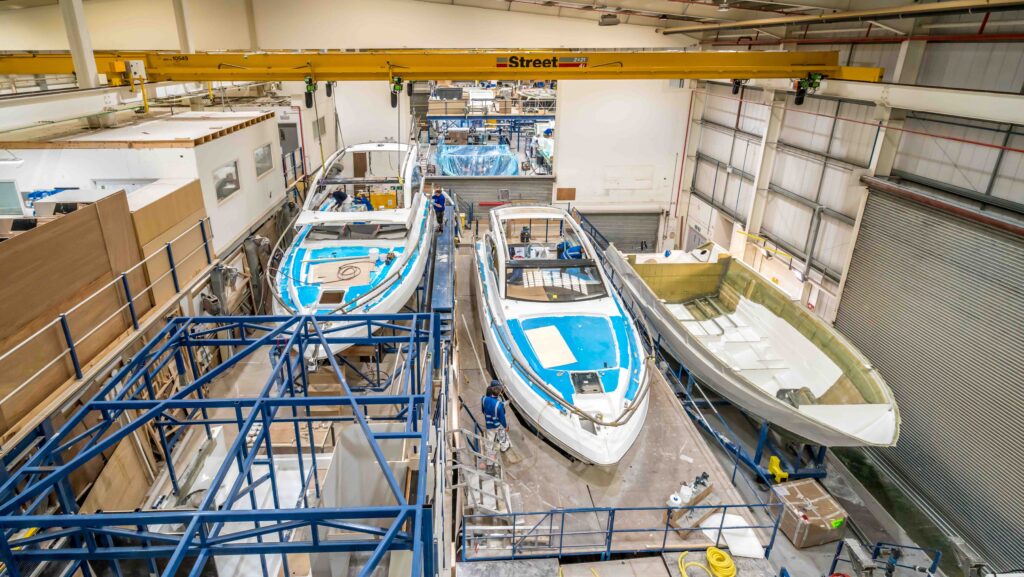
The administrators of Fairline Yachts have secured additional funding and launched a formal sale process to find a buyer for the historic British boatbuilder.
The Northamptonshire-based shipyard, which employs approximately 250 staff across two sites in Oundle and Suffolk, entered administration in January 2025, just two months after its acquisition by Arrowbolt Propulsion Systems Limited.
The insolvency process was initiated by the company’s primary lender, DF Capital, which has now provided additional funding to keep the business operational. It’s understood this funding will allow Fairline to continue the production and sale of its yachts while safeguarding the jobs of its 250 employees.
Fairline Yachts, founded in 1967, produces four yacht ranges, spanning from 33ft to 68ft (10 to 20.7 metres), which are sold worldwide both directly and through a global dealer network.
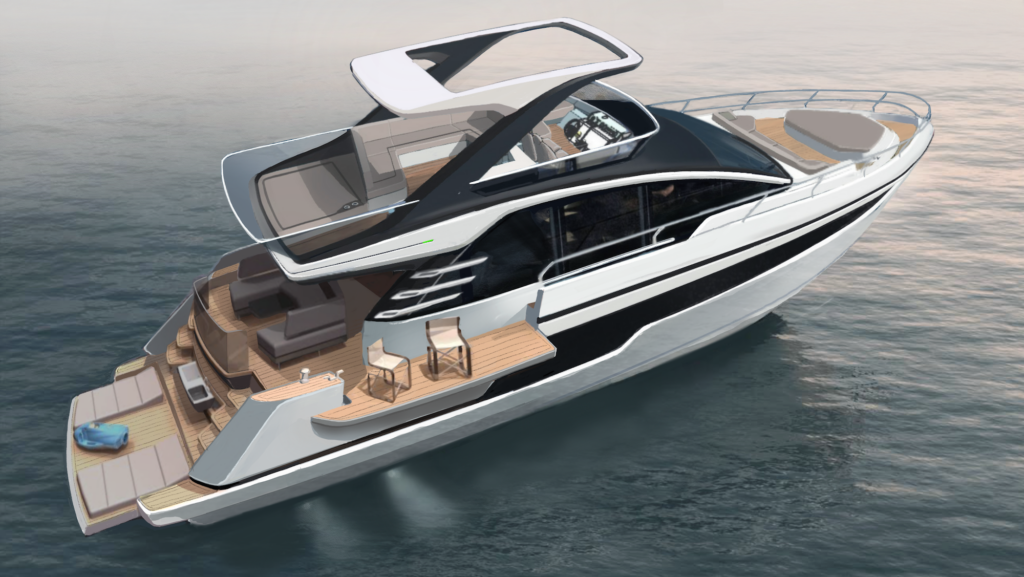
Michael Magnay, joint administrator at Alvarez & Marsal, states: “Fairline Yachts is an iconic brand with a committed and passionate team of experts who have established deep relationships with dealers and end customers over many years. The business is known throughout the world for the quality of its craftsmanship and the innovative design of its yachts.
“We expect that it could have broad appeal to international investors as well as domestic. We encourage interested parties to make contact with us to discuss the opportunity to acquire this exciting business.”
Fairline has faced financial turbulence before. In 2015, under the ownership of private equity firm Wessex Bristol, the company went into administration, resulting in 380 job losses before being acquired by Russian investors the following year. More recently, despite experiencing supply chain disruptions during the pandemic, and a labour shortage, Fairline maintained a strong order book, which was valued at £100m in early 2024. However, its latest accounts indicated a decline in turnover, dropping from £48.3m in 2022 to £41.1 million in 2023, though forecasts for 2024 had anticipated a rebound.
The administrators are now inviting potential buyers, both domestic and international, to express interest in acquiring Fairline Yachts.
Acknowledgement Marine Industry News
European Marine Services Ltd
Marine Surveyors & Consultants | ADR & Mediation | Expert Witness
www.europeanmarinesurveys.com
Tel: (44) 01603 327 123
Is artificial intelligence changing marine marketing?January 9, 2025

Artificial intelligence (AI), namely generative AI, is redefining the landscape for marketers, communicators and media. Whether it’s transforming traditional search engine optimisation (SEO) or it’s creating new ways to understand and connect with customers, AI is changing marine marketing.
AI is already impacting how customers consume information and how companies share information and the industry needs to be ready to harness and adapt to the technology.
Ellen Bradley, chief brand officer of National Marine Manufacturers Association (NMMA) in the US, has been witnessing first hand how new AI technology is changing the marine marketing landscape.
“In driving advocacy on behalf of our members and in helping connect the greater industry with boaters and future boaters through Discover Boating, NMMA is constantly exploring, testing and optimising how to most effectively share our industry’s story.
Artificial intelligence in marketing
When it comes to building relationships and connections with customers and future customers, Bradley says embracing AI is no longer an option but a necessity for businesses seeking to thrive in a competitive landscape.
And it’s not just marketers who should be thinking about it but entire organisations, across the C-suite.
“Today, AI-powered tools and the promise of what’s to come with AI, is transforming how we communicate, connect, work, and play. In business, and particularly marketing, it has enabled companies to tailor their strategies to individual consumers on a massive scale, opening doors to engage customers in more meaningful ways than ever before.
“In marketing, one of the areas we’re seeing dramatic shifts is in SEO — something that’s core to how a business is discovered within search engines like Google and Bing. Traditionally, SEO focused on keyword optimisation and backlink building.”
Artificial intelligence for SEO
Bradley says AI is changing the SEO landscape, putting more emphasis on user experience and intent. Search engines like Google have been utilising AI algorithms for years to rank and display web pages based on their relevance and quality. These AI-powered algorithms are now more adept at understanding and interpreting search queries — getting to know the user searching for the content or information, leading to a more semantic and contextual approach to search.
As a result, a significant transformation brought by AI is what feels like a return to a prioritised focus on content relevance and quality.
“With AI, the importance of keyword-centric optimisation has diminished,” explains Bradley. “This shift has made SEO more about delivering value through content and engaging users. For anyone who’s a creative, communicator or storyteller, this is likely music to your ears and is a reminder of the important role that remains for human-powered creativity and storytelling.”
At the same time, Bradley says marketers now have generative AI tools at their disposal to help create content and do so in a way that helps them personalise it so they’re providing customers with greater value. “These tools can help marketers produce high-quality, relevant content more efficiently, enhancing SEO performance. Again, human creativity remains crucial in this process,” she adds.
“AI-driven tools have also further enhanced technical SEO processes. Machine learning algorithms can perform website audits, organise content and optimise performance at an unprecedented pace. They can analyse vast amounts of data, identify opportunities for improvement, and predict trends, enabling marketers to make data-driven decisions that enhance their SEO and content strategies, so content is more impactful to more people.
How will artificial intelligence impact the maritime industry and marketing teams?
“One of the most significant advantages AI offers is its ability to analyse large amounts of data not only quickly, but accurately. In marketing, where customer data is abundant but often underutilised given the immense amount of time it can take to analyse, AI can be a gamechanger.
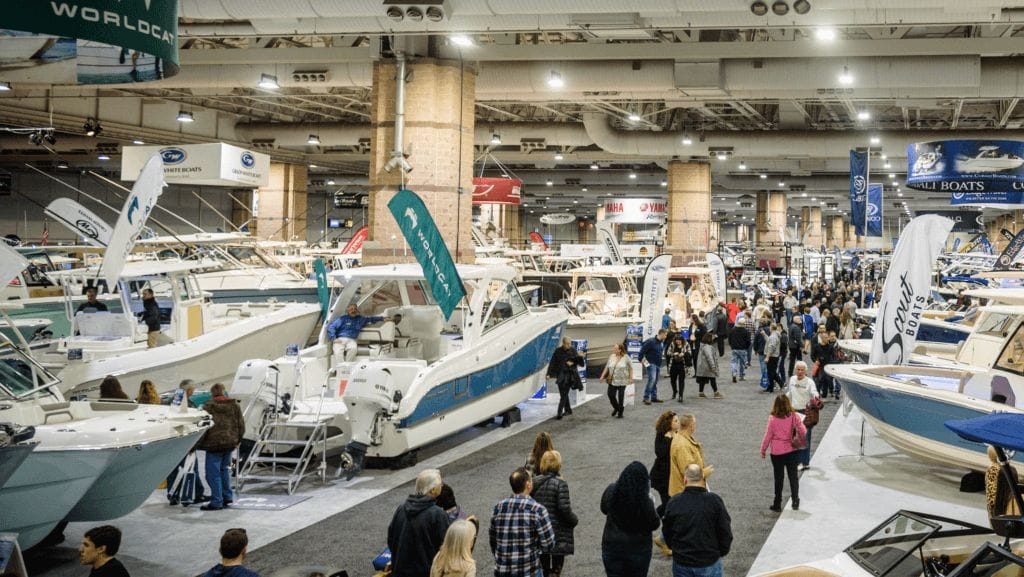
“By employing machine learning algorithms, businesses can segment their customers based on preferences, behaviours and patterns. This targeted approach allows for hyper-personalised marketing campaigns that resonate with each individual customer, ultimately driving higher conversion rates and customer loyalty. And while these tools may not be commonplace for many small businesses just yet, they will be. Learning and understanding how they work now will help companies ensure they’re not
left behind.”
Using AI in marine marketing enables users to leverage data from various sources, such as social media networks, search engines, and user browsing behaviour on a website, to provide personalised product recommendations.
“By analysing a customer’s purchase history, browsing activities on your site, and preferences, AI algorithms can predict their future needs and suggest relevant products or services. This level of personalisation can improve your customers’ experience and therefore sales/engagement, in addition to increasing opportunities for cross-selling and upselling by making it easier to share relevant information and products with your customers,” says Bradley.
Whether it’s SEO, content creation, personalisation, customer engagement, data management and insights, or other areas of business, the speed at which AI technologies are advancing is remarkable.
Bradley notes that culture within companies remains critical. “Those companies that embrace their teams’ exploration and provide an environment filled with psychological safety where it’s okay to ask questions, share ideas and make mistakes without fear of negative consequences, will be the ones that naturally adapt.
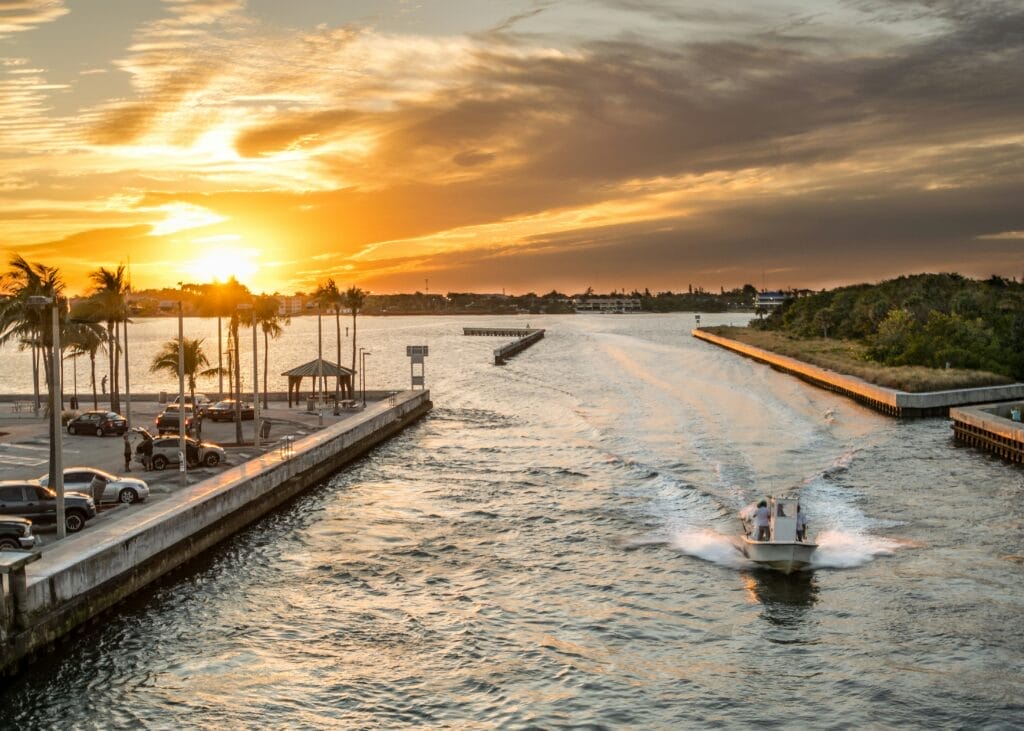
“While AI is bringing a lot of exciting new ways of doing business, it’s also bringing a great amount of uncertainty and for some, fear. Because of how fast moving it is, and because there remains a lot yet to understand, before companies dive into AI it’s important to approach it with thought and intent, particularly when it comes to the myriad ethical questions that AI creates.
“Whether its data integrity, transparency on sourcing content, navigating the bias and discrimination that can come from AI, deep fakes and other misinformation, or the privacy and security risks of AI, before adapting it across a business, it’s critical to ensure there are clear guardrails and ethical guidelines in place to protect employees, customers and business.
“Like many businesses and trade associations, we know that everything we do, and the impact we can have, is rooted in our relationships — the ones we have, the ones we’re building, and the ones that happen because of the great work we do on behalf of our existing customers and partners.
“It’s this focus on relationships that has us looking at the impact AI is having, and may have, on how we continue to both cultivate and nurture relationships in a meaningful way. We know a lot of companies are grappling with the same and as an industry trade association, sharing what we’re learning is an important part of our AI journey.”
Acknowledgement to Marine Industry News
European Marine Services Ltd
Marine Surveyors & Consultants | ADR & Mediation | Expert Witness
www.europeanmarinesurveys.com
Tel: (44) 01603 327 123
Princess Yachts lays off 250 staff amid ‘market challenges’January 8, 2025
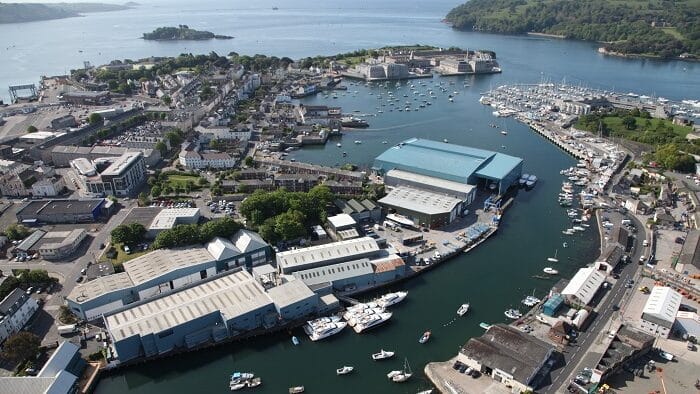
British boatbuilder Princess Yachts has confirmed it plans to cut approximately 250 jobs at its Plymouth shipyard, citing “challenging market conditions” and a need to streamline its operations.
The luxury yacht manufacturer, which currently employs about 2,700 people, is entering a period of consultation with union representatives and affected employees. The redundancies, representing just under 10 per cent of the workforce, will primarily impact hourly-paid roles across various operational areas.
In a statement shared with MIN, the firm says this will involve “streamlining some of its processes to build a more flexible operation around its most experienced and skilled people” with an “increased focus on quality and operational efficiency”.
This follows a challenging financial period, with Princess Yachts reporting a £69m pre-tax loss in 2022.
In a statement shared with staff and media, CEO Will Green says that 2024 has been an “important turnaround year” for the company, with significant progress in improving efficiencies and launching new products.
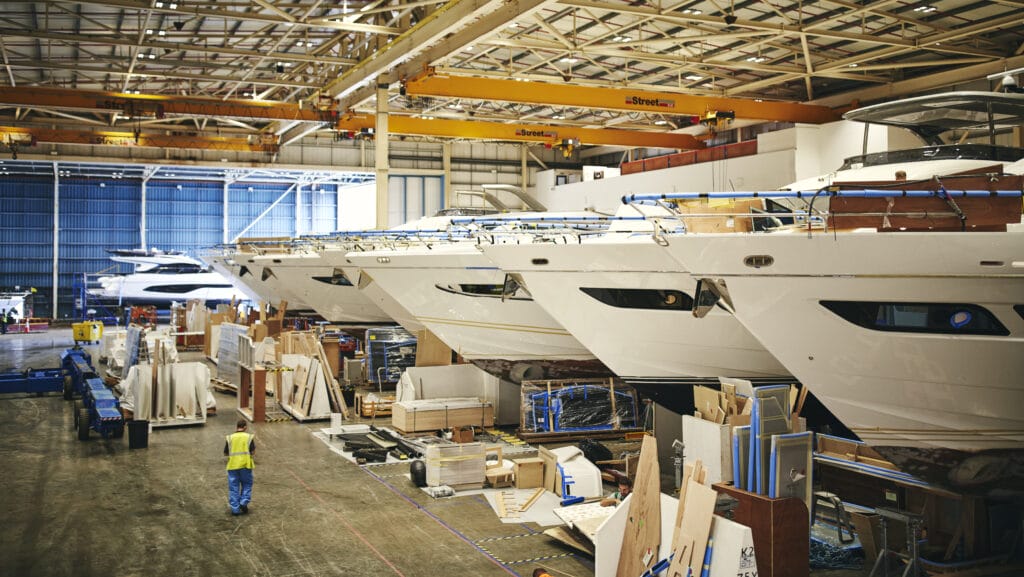
“We have not been immune to the global downturn that has been affecting the industry,” says Green. “Making any decisions that directly affect people’s jobs is always difficult, but we have a responsibility to all staff to ensure we have a strong business. I am confident that these adjustments, together with the progress we have made on our turnaround plans this year, will underpin a much more robust business long-term and allow us to concentrate on what we do best – building the highest quality yachts in the market.”
Princess Yachts attributed some of its financial struggles to rising costs, supply chain disruptions, and delays in the delivery of key components. The company has also faced pressures stemming from government policies, including tax measures that Green described as having “severely impacted” its recovery plan.
Nevertheless, a strong order book and investment from private equity firm KPS Capital Partners, which acquired the business in March 2023, have supported its operations and underpin future growth plans. KPS injected around £54m into the company, enabling investments in its South Yard production facility and other areas.
The redundancies come after a smaller round of layoffs earlier this year, which affected around 40 office-based roles.
The company says it remains focused on launching new models, such as the S80 and S65 introduced in 2024, and the F58 and V65 scheduled for 2025. Green argues that these measures will help build a “stronger business in anticipation of the market returning to normal”.
Speaking to the BBC, Plymouth MP Luke Pollard described the job cuts as “awful news for all those affected” and emphasised the importance of Princess Yachts to the local economy. “Ensuring they can continue to operate sustainably is vital,” he said, adding that the timing of the redundancies, just before Christmas, made the news even harder for employees.
In its statement, Princess Yachts reiterated its commitment to supporting employees through the consultation process and said that the layoffs, while “unfortunate”, are necessary for the company’s long-term sustainability and success.
Acknowledgement to Marine Industry News
For more information contact:
European Marine Services Ltd
Marine Surveyors & Consultants | ADR & Mediation | Expert Witness
www.europeanmarinesurveys.com
Tel: (44) 01603 327 123
Lithium Battery Boat Fires – be awareFebruary 29, 2024
With over 1,000 spontaneous lithium battery fires reported each week, it’s crucial for all yacht owners to make informed decisions about lithium battery storage.
Lithium-ion batteries can cause fires or explosions due to thermal runaway. Thermal runaway occurs when a lithium-ion battery cell creates more heat than it can effectively disperse
Lithium-ion batteries can start fires :
The incorrect charger is used,
The device or battery has been damaged,
There is a system fault or product defect.
To prevent lithium-ion battery overheating, consider the following safety measures:
-
Monitor Charging Temperatures:
- Charge batteries within safe temperature ranges.
- Use chargers specifically designed for lithium-ion batteries with built-in temperature monitoring.
-
Avoid Overcharging:
-
Cooling Provisions:
- Implement cooling mechanisms such as fans or heat sinks to dissipate excess heat from the battery pack.
- Link cooling provisions to a Battery Management System (BMS) to reduce battery pack temperature if it gets too hot.
- Ensure proper monitoring of the BMS to prevent indirect failure of the lithium-ion batteries.
-
Insulation and Thermal Management:
- Use insulation materials to protect batteries from extreme temperatures.
- Optimize thermal management systems to prevent thermal runaway and ignition of fire.
Remember that proper education, storage, and recycling of lithium-ion batteries are crucial for safety. Let’s keep our energy storage technology secure and reliable.
For more information contact:
European Marine Services Ltd
Marine Surveyors & Consultants | ADR & Mediation | Expert Witness
www.europeanmarinesurveys.com
Tel: (44) 01603 327 123
Broom Boats in Norfolk up for sale after 125 yearsFebruary 20, 2024
British marine and leisure firm Broom Boats of Brundall, which has operated on the Norfolk Broads for 125 years, has been put up for sale.
Located on the River Yare, Broom Boats was established in 1898 and is known for building boats and its fleet of charter vessels. The business also operates as a marina and boat yard, offering repair and maintenance services, although its boatbuilding arm closed in 2018.
Specialist business property adviser Christie & Co has been instructed to sell Broom Boats of Brundall on behalf of Broom Marine Group.
Local news outlet Eastern Daily Press reports that the owners want to sell so they can focus on their other company, a strategic land and property development business.
The business originally established a hire fleet in 1912, enabling clients to explore the unique landscape of the Norfolk Broads National Park. Today, the business operates one of the newest fleets on the Norfolk Broads.
The 8.6-acre (3.49 ha) freehold site provides over 72,000 sq ft (6,719 sq m) of marine-related buildings together with 78 private marina berths and a £3.28m hire fleet comprising 24 luxury cruisers and six electrically operated day-craft and two fishing boats.
The most recent addition to the business was the acquisition of the former Yare public house adjacent to the site entrance in 2022. The property underwent a £600,000 transformation, opening in October 2022 as The White Heron with a food menu introduced in April 2023 and B&B from boats moored adjacent to the pub in November last year.
Christie & Co says offers are invited for the business, which will be sold as a going concern, with staff transferring to a new owner at completion.
“We’ve witnessed an uptick in demand for both inland and coastal marina and boating businesses over the last 18 months,” says Jon Patrick, head of leisure and development at Christie & Co, who is handling the sale process. “This has come from existing UK and European operators, as well as boating and marine enthusiasts and investors.
“However, we’ve also seen greater activity in the sector from owners of holiday parks and associated leisure hospitality businesses, which do share some similarities in terms of the underlying business model with marinas. As a result, we anticipate that interest in Broom Boats will come from a diverse range of parties.”
Courtesy of Industry News
For more information contact European Marine Services Ltd.
Marine Surveyors & Consultants | ADR Mediation | Expert Witness
www.europeanmarinesurveys.com
Tel: (44) 01603 327 123
Ocean Rowing Boats – Rannoch R45 – Atlantic & Pacific #02111 \ #02147January 16, 2024
In mid and late 2023 European Marine Services undertook two most interesting marine insurance surveys / inspections of 2x Rannoch R45 Ocean Row Boats
Team ‘HODL’ (Hold on for Dear Life) Rowing the Pacific Ocean from USA to Hawaii – 3 Man Crew
Pacific Rowing Challenge 2023
Team HODL is a 3-person crew taking on the challenge of rowing across the Pacific Ocean, from Monterey Bay California to Hawaii, to raise donations for the Ocean Cleanup Charity. It’s a 2,800 mile journey that if completed in under 60 days, becomes a World Record too.
It’s a project that started with planning 18 months ago. At the beginning, the team had no financial resources or boat. They spent their early days doing marketing stunts such as rowing on a borrowed rowing machine in parks. This got them press attention and then allowed them to reach out to sponsors. From there, the project grew larger and larger, with media attention coming from ITV, BBC and Sky News.
As mentioned, the journey will take around 60 days and within that, each person will roughly row 16 hours a day, and rest for 8 hours. The shift pattern is to row for 3 hours and rest 90 minutes at a time. That rest does not necessarily mean sleep as they need to fuel themselves, hydrate, clean their bodies and maintain any issues with the boat. On average, each crew member will consume between 5,000 – 6,000 kcal per day and drink around 6 litres of water. The water is produced through a water-maker that separates the water and the salts from the sea water.
Team ‘The Big Oardeal’ Rowing the Atlantic Ocean from Canary Isles to Antigua – 4 Man Crew
” Talisker Whisky Atlantic Challenge”
Starting from San Sebastián de La Gomera in the Canary Islands and finishing in Antigua.
Rowing 24 hours a day, 7 days a week, and hoping to complete the journey in about 35 days.
Rowing over 1.5 million strokes, burning 5,000 + calories a day, and facing waves up to 20 feet high.
Rowing a 28-foot Rannoch RX45 specially designed for ocean voyages
Update 16 Jan 2024: Day 34 Currently lying in 12th position with 600nm left to row. The lead boat is almost there
File photos
For more information contact European Marine Services Ltd.
Marine Surveyors & Consultants | ADR Mediation | Expert Witness
www.europeanmarinesurveys.com
Tel: (44) 01603 327 123
Princess Yachts – Sold to private US equity firmFebruary 16, 2023
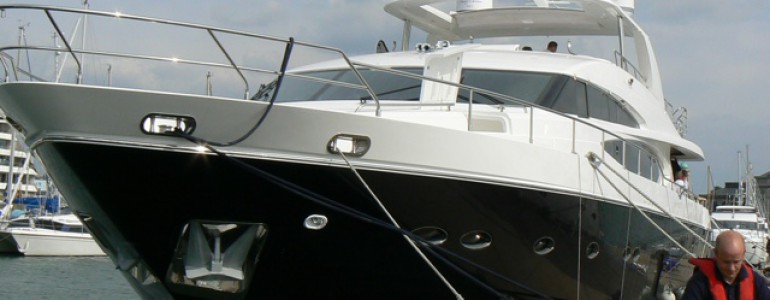
Princess 95′ PPI Pre-delivery Inspection undertaken by EMS
Plymouth-based Princess Yachts, Britain’s largest luxury boatbuilder, has been sold to a US-based private equity firm.
Princess was put up for sale in 2022 by private equity group L Catterton, who reportedly hired bankers at Macquarie to find a buyer.
In a statement issued this morning (14 February 2023), Princess confirms that KPS Capital Partners has entered into a definitive agreement to acquire a controlling equity interest in the business.
KPS is a New York-based private equity giant that makes controlling equity investments in manufacturing companies, in North America and Europe. The firm has approximately $14.4 billion of capital under management, as of September 2022.
In 2019, KPS acquired the fitness equipment business of Brunswick Corporation, including the Life Fitness brand, for $490 million in cash.
Existing shareholders will retain ownership in Princess, with the transaction expected to be completed in the first quarter of 2023.
The moves come after the company announced expansion plans last year as part of the successful bid by Plymouth city council to create a freeport in the region. Princess says this new investment from KPS will ‘help support these plans and reinforce the unique national and international marine capabilities that reside in Plymouth and the wider South West region’.
The Princess business was founded in 1965, and distributes through a 50-strong global network. It had been backed by L Catterton and its predecessor entity since 2008.
Ryan Harrison, a partner of KPS Mid-Cap Investments, says: “We are excited to make this significant investment in Princes Yachts, a leading company in the luxury global yachting industry with an iconic brand grounded in British tradition, a remarkable and growing product range, and world-wide reputation for quality and innovation.
“KPS’ investment will accelerate Princess’ growth trajectory and fund numerous investments for its future. We look forward to working with Princess’ existing stockholders, chief executive officer, Antony Sheriff, the senior leadership team, and the talented employee base at Princess Yachts.”
Antony Sheriff, Princess Yachts‘ chief executive, adds: “We are thrilled to partner with KPS for this exciting new chapter for Princess Yachts. KPS and the Princess Yachts team are deeply committed to investing in the company’s future while continuing to further strengthen our portfolio of best-in-class motor yachts. With a current order book nearing a record $1 billion and many model lines sold into 2025, we have never been in a stronger commercial position.
“Together with KPS’ tremendous track record of manufacturing excellence and investing in leading brands, we are now positioned to take Princess Yachts to the next level of industry leadership in quality and innovation. Under KPS’ ownership, we will accelerate a range of growth and operational initiatives to build upon our long and successful history.”
Acknowledgement to Marine Industry News
For more information contact European Marine Services Ltd.
Marine Surveyors & Consultants | ADR Mediation | Expert Witness
www.europeanmarinesurveys.com
Tel: (44) 01603 327 123
IBTC Portsmouth to close in spring 2023June 1, 2022
The International Boatbuilding Training College (IBTC) in Portsmouth is to close in March 2023.
IBTC Portsmouth teaches traditional wooden boatbuilding and joinery techniques, in the heart of Portsmouth Historic Dockyard on the English south coast.
In a brief media statement announcing the news, the college explains that the decision to close has “been a very difficult one to make and has not been taken lightly”, and reassures that all current students will graduate as planned.
The statement reads: “Rising costs and falling student numbers have made it impossible to continue. Our current students will graduate as planned, but no more students will be enrolled and the college will close completely in March 2023. We understand that this will be upsetting news for many who hoped to study with us in future years.
“We hope that you take comfort from knowing that there are still two excellent boatbuilding colleges in England: IBTC Lowestoft and the Boat Building Academy in Lyme Regis.
“We are immensely grateful to Portsmouth Naval Base Property Trust, which rescued the College when it fell into financial difficulties in 2017. They have raised funds, invested in our team, and provided practical support throughout the last five years. We wish to thank them and our amazing staff for all the hard work and dedication to traditional wooden boatbuilding that they have demonstrated.
“Boathouse 4, the beautiful inter-war building where we are based, will remain open and continue to be an important hub for boat restoration and maintenance skills. Portsmouth Naval Base Property Trust’s team of brilliant volunteers and staff will maintain the Trust’s world-class collection of historic boats in the building for years to come.”
Hannah Cunliffe, director of National Historic Ships UK says: “It is sad to hear of the closure of IBTC Portsmouth, which has been a nucleus for passing on traditional skills since its opening in 2015. However, I’m pleased that Boathouse 4 will be continuing its role as our Shipshape Hub in the South East, offering support to the sector whilst displaying and caring for the Portsmouth Naval Base Property Trust’s significant vessel collection.”
Since IBTC Portsmouth opened its doors in 2015, it has trained over 100 students. Many have gone on to forge careers in boatbuilding, boat restoration, and allied industries; preserving traditional skills for future generations. The college says it is immensely proud of students’ success, and its “small part” in it.
For more information contact European Marine Services Ltd.
Marine Surveyors & Consultants | ADR Mediation | Expert Witness
www.europeanmarinesurveys.com
Tel: (44) 01603 327 123
Ainslie’s INEOS Britannia teams up with F1’s Mercedes for America’s CupOctober 5, 2021
INEOS Britannia has confirmed its core team to lead the British challenge for the 37th America’s Cup.
As part of the group, the British America’s Cup team joins forces with Mercedes-AMG F1 Applied Science, a division of the Mercedes-AMG Petronas F1 Team, to form INEOS Britannia, which INEOS says will bring together the best of the worlds of high-performance marine and automotive engineering, with the goal to win the America’s Cup for Britain.
Leading INEOS Britannia on and off the water into the 37th America’s Cup will be Sir Ben Ainslie, four-time Olympic gold medallist and one of only two British sailors to have won the America’s Cup (with Oracle Team USA in 2013) as team principal/CEO and skipper.
Backing the team again is INEOS and INEOS’ chairman and founder Sir Jim Ratcliffe, who previously supported the team’s 36th America’s Cup challenge. Sir Ratcliffe says: “The America’s Cup has been 170 years of pain for us in Britain. We’ve had fantastic sailors in this country, but we’ve never had the boat that could win. We believe that assembling this unique collection of elite sports teams will give us a stronger chance of achieving what has never been done before. There are many synergies across our sporting family and what Mercedes F1’s engineering and organisational expertise can add to our America’s Cup challenge is one of the strongest examples of that.”
“The America’s Cup is the ultimate team sport and to be successful you need continuity,” says Ainslie. “It takes time to develop the IP, skills and know-how necessary to be a winning team, especially when you are up against teams with over 25 years’ experience. As we enter our third campaign, we have taken a lot of learnings from our previous challenges and assembled a world class team combining talent from Formula 1 and the America’s Cup. Mercedes-AMG F1 Applied Science bring a legacy of design to the table. They are proven winners, it’s in their DNA, it’s in their culture.”
Leading the design concept for INEOS Britannia’s AC75 boat for the 37th America’s Cup campaign will be naval designer, Martin Fischer. German-born Fischer was most recently a key part of Luna Rossa Prada Pirelli’s design team for two America’s Cup campaigns, after spending 14 years working on the design of hulls and appendages for numerous projects.
Dave Endean, project director for the team’s 36th America’s Cup campaign, completes the leadership team as COO, responsible for the day-to-day running and operations of the team’s campaign alongside Ainslie.
James Allison will be the technical lead as chief technical officer of the Mercedes-AMG Petronas F1 Team and INEOS Britannia. Through Mercedes-AMG F1 Applied Science, Geoffrey Willis will be working with INEOS Britannia as technical director, having previously worked in the America’s Cup with Peter de Savary’s Blue Arrow Challenge.
“Our involvement in the 36th America’s Cup campaign certainly whetted our appetite,” says Allison. “For that campaign we came in quite late into the process and tried to add as much as we could through the design and engineering expertise of our applied science division.
“It was immediately clear to us that the America’s Cup is a very exciting, and very difficult, challenge. This time we are one team, INEOS Britannia, with the team’s design base embedded in our Formula 1 HQ, and the clear goal to bring the America’s Cup back to Britain. We feel very lucky to be involved in this opportunity and we can’t wait for the challenge ahead, it’s a mouth-watering prospect.”
The INEOS Britannia sailing team is currently in the process of reforming following the conclusion of the 36th America’s Cup. Giles Scott, the team’s tactician in Auckland, has become one of the first sailors to re-sign with the team following his gold medal in the Finn Class in the Tokyo 2020 Olympic Games.
As Challenger of Record, INEOS Britannia and Royal Yacht Squadron Ltd are currently working closely with the defender Emirates Team New Zealand (ETNZ) and the Royal New Zealand Yacht Squadron (RNZYS) to define a fair Protocol for the 37th America’s Cup due to be published 17 November. This will include retention of the AC75 class, cost reduction measures to attract a higher number of Challengers, a new crew nationality rule and the Women’s and Youth America’s Cup regattas announced last month.
Acknowledgement to Marine Industry News
For more information contact European Marine Services Ltd.
Marine Surveyors & Consultants | ADR Mediation | Expert Witness
www.europeanmarinesurveys.com
Tel: (44) 01603 327 123
Marine collaboration yields confirmation on post-Brexit VATApril 9, 2021
Recreational Craft – VAT issues Post-Brexit – See below Scenario’s
Following the UK’s withdrawal from the EU, there have been many questions which have caused confusion and uncertainty for the leisure marine sector both in the UK and in the EU27. Arguably, the biggest has been around the VAT status of recreational craft at the end of the transition period.
In a show of unity, the International Council of Marine Industry Associations (ICOMIA), European Boating Industry (EBI), European Boating Association (EBA), British Marine (BM) and the Royal Yachting Association (RYA) joined forces to provide clarification on VAT and customs for recreational boating companies and users. The five organisations have released this guidance to their members and non-members.
The group has put forward key scenarios affecting boaters (detailed below) and confirms that the European Commission has now responded, validating the interpretation of the guidance and how VAT should be applied under the various examples. This follows a push led by the EBI with the European Commission to provide this important clarification.
Positive confirmation of the scenarios should now also be recognised by each EU country in their dealings with this matter. Failure to do so could result in formal complaints being made to the European Commission. Further clarification will be sought on the documentation required and interpretation of establishment of “person established in the customs territory of the Union”.
Commenting on the collaboration, Philip Easthill, secretary general of the EBI, says: “We are delighted to have received the responses from the commission that companies and boaters urgently need. Given the impact of Brexit on businesses and supply chains, clarity on VAT for second-hand boats is highly important. The cooperation of EBI with our partners has been key and we will continue to advocate for clarity on VAT issues through our channels at EU level.”
Lesley Robinson, CEO of British Marine, adds: “Collaboratively working together with other leisure marine industry bodies is a highly successful way of collectively garnering results, and this recent clarity received on VAT issues post-Brexit will greatly benefit British Marine members and the UK leisure marine industry. The answers to these scenarios will be welcomed in particular by UK boat retailers and brokers to assist in maintaining a healthy trade of second-hand boats across the UK and EU.”
VAT issues scenario post-Brexit
The Union Customs Code referred to within this document can be found here.


The following acronyms are used:
TPE = The time at which the transition period ended – 31 December 2020, 23:00 UTC
VPS = VAT Paid Status: i.e. in free circulation
EU28 = EU before TPE, i.e. including UK
EU27 = EU after TPE, i.e. excluding UK
GB = England / Scotland / Wales excluding Northern Ireland
TA = Temporary Admission
RGR = Returned Goods Relief
UCC = Union Customs Code
Acknowledgement to Marine Industry News
For more information contact European Marine Services Ltd.
Marine Surveyors & Consultants | ADR Mediation | Expert Witness
www.europeanmarinesurveys.com
Tel: (44) 01603 327 123



